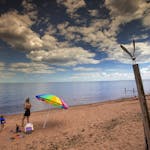The great blue herons nesting in their once-secret rookery in the woods near Rochester continue to stir up controversy. Now they are getting some lift from township officials.
On Thursday, the Rochester Township board agreed to study whether a proposed housing development that would cut through the unusual nesting grounds would significantly affect the majestic birds.
The environmental assessment was requested by Save the Rookery, a group created to protect the previously undocumented colony. Its petition now contains more than 1,400 signatures.
"We're thrilled," said Lynn Cornell, a local resident and member of Save the Rookery.
Township Clerk Randy Staver called the resolution "a good thing."
"It just shows people are willing to do due diligence," Staver said.
Staver said Rochester businesswoman Aderonke Mordi, the developer of Pavilion Estates, agreed to participate and offered no pushback. Mordi did not respond to a request for comment.
The environmental assessment will happen only if the Olmsted County Board next week votes to change the land-use designation for the forested acres to "suburban development," a change necessary for the project to proceed.
County spokeswoman Gretchen Williamson said in a statement that county planning staff "diligently reviewed" the proposed project and recommended that it meets county land-use standards. But Rochester Township has ultimate authority over the project.
Matthew Kitzmann, chairman of the Rochester Township board, said such environmental assessments typically cost around $25,000 and are done and paid for by the party proposing the project. The entire process takes about 60 to 120 days, including time for public comments.
"Anybody can analyze it," he said of the assessment information.
With 10 homes on 30 wooded acres, the proposed development itself is not unusual, township clerk Staver said: "That's the lifestyle that these folks like — a bit more rural and a bit more wildlife."
But usually it's deer and turkeys under discussion, he said, not great blue herons.
The herons don't normally nest in upland forests but stick closer to lakes and rivers.
That's a key reason this heron rookery is so unusual, said Carrol Henderson, a retired state Department of Natural Resources (DNR) nongame wildlife biologist.
In late April, Henderson testified in Olmsted County District Court about the rookery's significance, supporting a restraining order to stop trees from being cut down for construction. The rookery spans wooded land owned by three residents, including two who have sued under the state Environmental Protection Act to protect the land as a unique natural resource. The suit is ongoing.
Henderson said in an interview that the herons — birds with wing spans of up to 6 feet — typically kill the trees they nest in because of the acidic nature of their droppings. But in this case, the trees are all still alive, perhaps because they stand on a slope that leads down to a creek and allows the droppings to wash away.
"There has never been any studies on that type of heron colony. It's pretty much untested," he said. The nesting area was not even identified in the Minnesota Breeding Bird Atlas.
"It's been a surprise virtually to everyone who is associated with understanding these heron colonies," Henderson said. "This is a natural history treasure."
He said the great blue heron population in Minnesota is not stable, as suggested recently by the local Migratory Birds Program of the U.S. Fish and Wildlife Service in Bloomington. Henderson said the national head of the federal agency's breeding bird survey told him that, in fact, the number of great blue herons in Minnesota has dropped by half since 1967, declining about 1% every year.
That surprised him, he said: "We have not been taking a hard enough look at the status of these colonial nesting water birds."
Henderson said he thinks the Rochester Township rookery qualifies as a state Scientific and Natural Area.
"To me a heron colony is always kind of a mystical place," he said.
Henderson said he hopes the site gets permanent protection. "It could add some community pride to protecting this site," he said.
Jennifer Bjorhus • 612-673-4683





